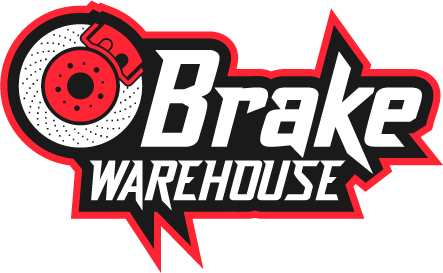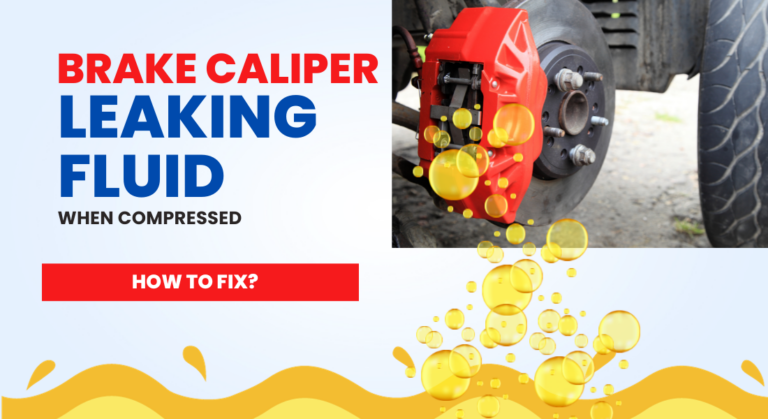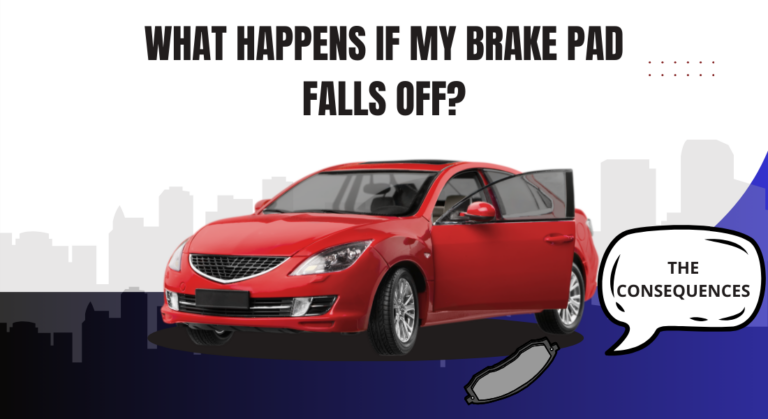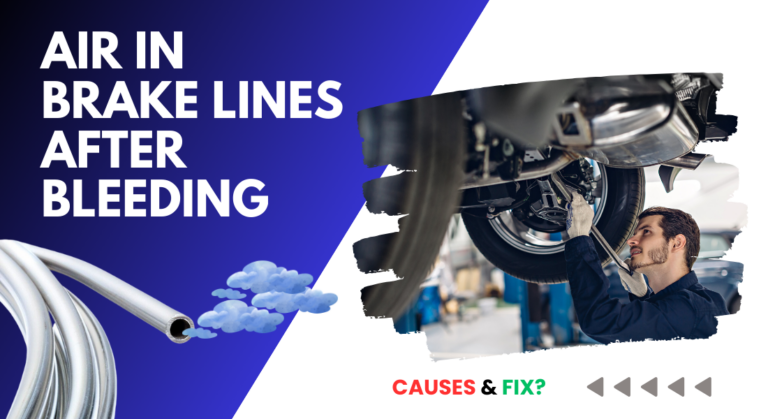My Brake Pedal Is Pushing Back – Why & How To Fix It?
Your car’s brake pedal is intentionally designed to provide resistance when pressed, referred to as brake pedal travel. Its purpose is to serve as a warning that your brakes are about to activate. If the pedal travels excessively, it signals imminent brake engagement, indicating the need to release pressure on the pedal.
Brake pedal pushback can occur for various reasons. They include air in the brake lines, worn brake components, or malfunctioning calipers. These issues disrupt braking efficiency and lead to the pedal pushing back during braking.
This guide aims to help you solve why my brake pedal is pushing back.
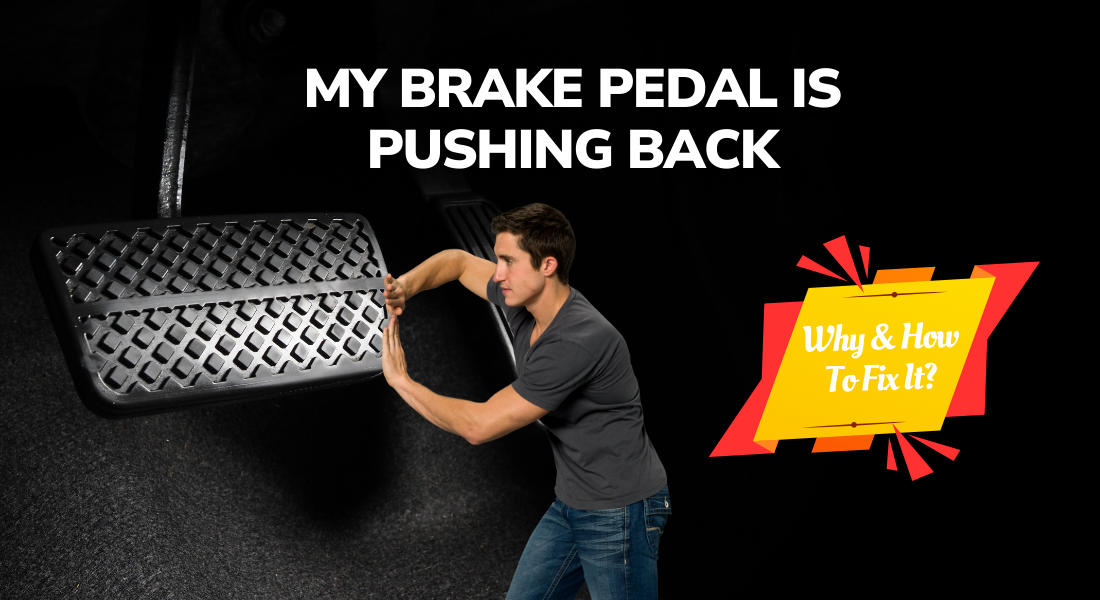
Why My Brake Pedal Is Pushing Back? 5 Reasons To Check
Brake pedals pushing back during braking. This concern is especially critical, as even a minor anomaly in the brake system can have significant safety implications.
Here are the prime reasons of brake pedal pushing back.
1. Anti-Lock Braking System (ABS) Activation
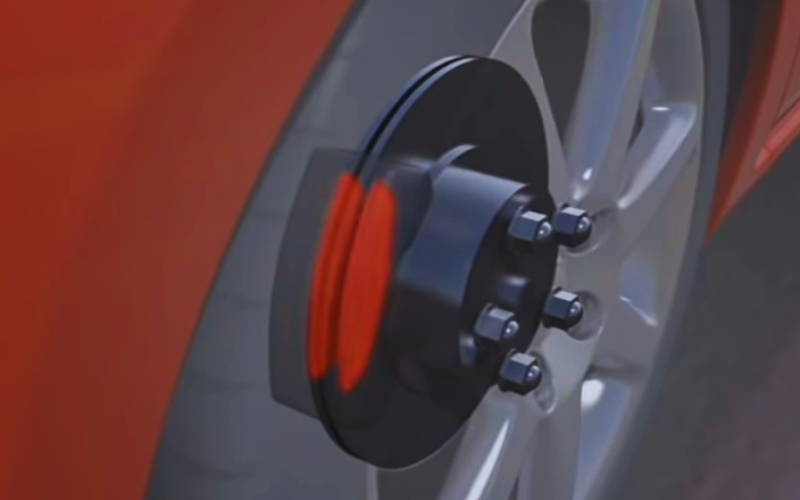
A frequently encountered reason for a brake pedal pushing back is the activation of the Anti-Lock Braking System (ABS).
ABS is engineered to prevent wheel lock-up during sudden or aggressive braking. It enhances vehicle control and steering.
When the ABS is triggered, it rapidly applies and releases brake pressure, resulting in a pulsating feeling in the pedal. This pulsation can be interpreted as a slight push back with Hindi sub.
It’s crucial to understand that ABS activation is a regular occurrence. However, you should be anticipated in specific driving scenarios, like on slippery surfaces or during emergency braking.
Read Also: What Causes Brake Pedal Sticking? (Fix Now)
2. Brake Push Back Due to Warped Brake Rotors
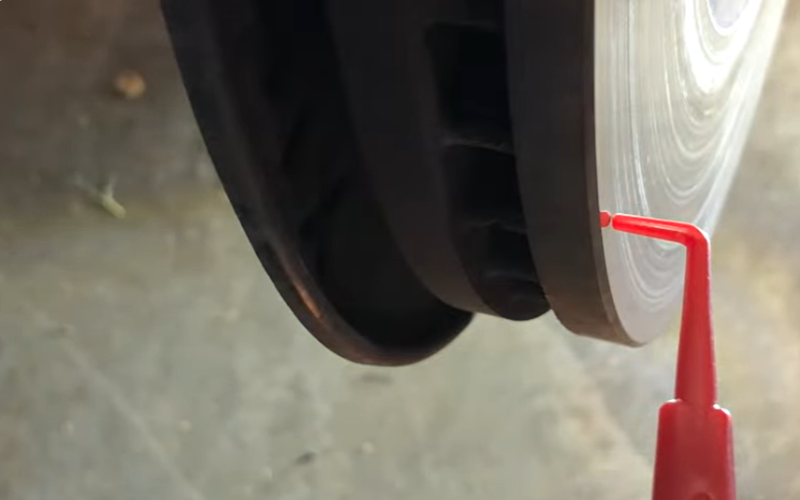
Another factor that can lead to a pushing back brake pedal is the presence of warped brake rotors.
Brake rotors can gradually develop uneven wear or distortion over time. Generally, it happens due to excessive heat, aggressive driving habits, or improper braking techniques.
When the brake pads come into contact with these uneven rotor surfaces, it can result in irregular brake pedal pushing back.
If you suspect that your rotors have become warped, it is essential to have them inspected. At the same time, resurfacing or replacing is necessary for a reliable braking performance.
3. Issues Arising from Faulty Brake Calipers
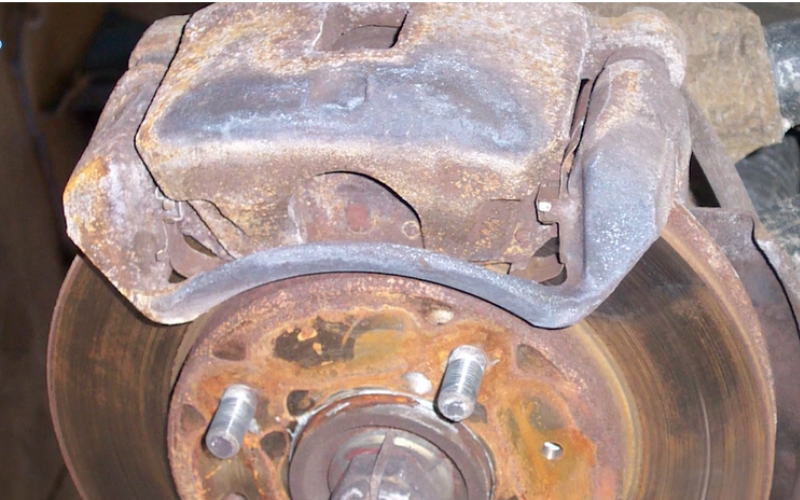
Brake calipers play a pivotal role in applying and releasing brake pads against the rotors. When a brake caliper malfunctions or becomes stuck, it can disrupt the even distribution of pressure. Thus, it gives the brake pedal a pushing back.
If the caliper fails to retract as intended, it can keep the brake pad in constant contact with the rotor. Such an act causes the sensation of a push back.
In these instances, addressing the problem may necessitate repairing or replacing the affected caliper. It ensures the correct operation of the brakes.
Read Also: How to Fix Hard Brake Pedals After Bleeding?
4. Degraded or Defective Brake Elements
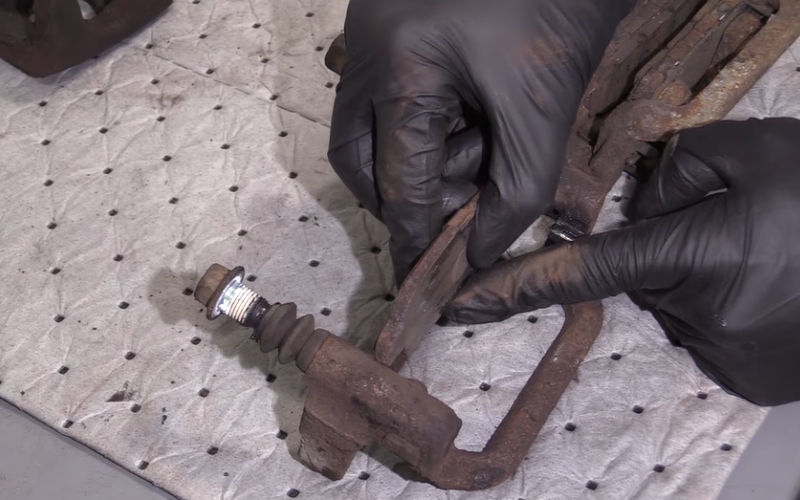
Brake components like brake pads, shoes, or associated hardware plays a role in the occurrence of a pushing back brake pedal.
In cases where brake pads or shoes have worn excessively, they may fail to establish consistent contact with the rotors or drums. It causes uneven braking action and pedal feedback.
Likewise, if brake hardware such as clips, springs, or shims becomes loose or damaged, it can disrupt the proper movement of brake components, leading to pedal push back.
To improve brake performance, it is imperative to conduct inspections. Then, replace any worn or flawed brake elements as necessary.
5. Hydraulic System Malfunctions

Complications within the hydraulic system can also be responsible for a pushing brake pedal.
Air in the brake lines, deteriorated brake fluid, or a malfunctioning master cylinder are such complications. These can disrupt the proper distribution of pressure and impact pedal responsiveness. Air bubbles trapped in the brake lines can compress and lead to a spongy pedal feel.
Also, contaminated brake fluid can affect hydraulic pressure. Moreover, a faulty master cylinder may introduce inconsistencies in braking force, contributing to the sensation of a kicking pedal.
A thorough inspection of the hydraulic system is important. Additionally, coupled with necessary repairs or fluid replacement are essential to solve these concerns.
Read Also: Clicking Sound when Pressing Brake Pedal – Causes & Fixes?
6. Additional Reasons
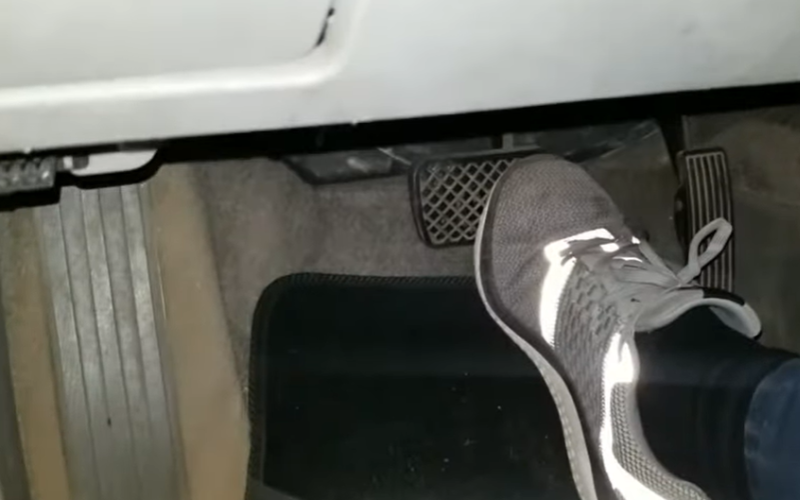
In specific scenarios, factors unrelated to the brake system may be responsible for a pushing back brake pedal.
For instance, problems within the suspension or drivetrain, such as
- Worn-out suspension components
- Damaged axles
- Malfunctioning wheel bearings,
The above points can transmit vibrations that cause pedal pushback.
Additionally, tires with uneven wear patterns or wheels out of balance can contribute to pedal feedback. Consider these variables and undertake any requisite repairs or adjustments to maintain a seamless and dependable braking experience.
Read Also: Brake Pedal Goes to Floor After New Master Cylinder – Why?
Indications of Brake Pedal push back:
When a vehicle’s brake pedal exhibits push back, the driver may encounter a variety of symptoms.
Several common symptoms are:
- Soft or Spongy Brake Pedal: During brake pedal push back, applying pressure to it may yield a soft or spongy feel. This can cause the ability to bring the vehicle to a smooth stop and regulate brake force effectively.
- Challenges in Halting the Vehicle: Due to the inconsistent response of the brake pedal, the driver may face difficulties in bringing the vehicle to a stop when necessary. This situation can be hazardous during emergencies. It demands swift and precise braking to avert accidents or collisions.
- Abrupt and Unpredictable Movements: Brake pedal push back can lead to unexpected and sudden vehicle jerking or lurching motions. Such occurrences can disorient the driver and make it challenging to maintain control of the vehicle.
In certain cases, brake pedal push back can lead to a total failure of the vehicle’s braking system. It results in a complete loss of braking capability. This situation can be exceedingly tricky and demands immediate attention and resolution.
Read Also: What Causes Brake Pedal Pulsation ABS System? – Fix Now
How to Fix Brake Pedal Push back Issue?
Addressing brake pedal push back involves various potential solutions contingent upon the underlying issue.
Several solutions are discussed below.
- Replacing Brake Pads: When brake pads are excessively worn, they necessitate replacement. This action restores the brake system’s ability to generate friction, effectively stopping the vehicle’s wheels.
- Brake Caliper Servicing: A mechanic’s service is required if brake calipers are sticking or malfunctioning. This may encompass cleaning and lubricating the calipers or even replacing them entirely.
- Brake Line Bleeding: Bleeding the brake system is essential to eliminate air from the brake lines. This procedure employs specialized equipment to expel air from the brake lines and replenish them with fresh brake fluid.
Brake pedal push back may result from combining these factors in certain instances, necessitating multiple solutions. It is vital to engage a mechanic to diagnose the cause of the issue and recommend the appropriate repairs.
Read Also: Why Does Brake Pedal Goes to Floor after Bleeding?(4 Causes)
FAQs
Is it normal for a brake pedal to push back sometimes?
No, it is not normal for a brake pedal to push back sometimes. Brake pedal push back typically indicates an issue within the braking system, such as air in the brake lines, worn brake components, or faulty calipers. It should be investigated and resolved promptly to ensure safe and reliable braking.
What should I do if my brake pedal pushes back during emergency braking?
If your brake pedal pushes back during emergency braking, remain calm and firmly apply consistent pressure to the pedal. Avoid pumping the brakes. Steer the vehicle to a safe location if possible. After the emergency, inspect your braking system with a professional mechanic to address any underlying issues.
Is it dangerous if my brake pedal is pushed back frequently?
Yes, frequent brake pedal push back is dangerous. It indicates underlying issues with your braking system, compromising your ability to stop the vehicle effectively. This can lead to reduced control and increased risk of accidents. Immediate inspection and repair by a qualified mechanic are essential for safety.
Last Words
Brakes play a critical role in a vehicle’s mechanics. It is crucial to maintain them properly. If you encounter brake pedal push back issues, you should have them professionally diagnosed before attempting self-repairs.
Such approaches save time and ensure you know the correct course of action. If you need more clarification, seek professional assistance to prevent further damage. While many follow this procedure, it’s essential to consider the above discussion on why is my brake pedal pushing back.

Meet Zayan, the mechanical genius behind the highly acclaimed brakes problems and solutions website. With over a decade of hands-on experience in the automotive industry, Zayan has become a trusted authority in the realm of brake systems.
His passion for cars, coupled with his expertise in solving complex brake-related issues, has earned him a devoted following of car enthusiasts, mechanics, and everyday drivers seeking reliable guidance.
